多音节词和部分双音节词在词前加more.
形容词和副词比较级和最高级变化规则

形容词和副词比较级和最高级变化规则
1.单音节词和部分双音节词:
- 在比较级前面加more,最高级前面加the most。
例如:happy(快乐)- happier(更快乐)- the happiest(最快乐)。
2.以字母e结尾的形容词和副词:
- 在比较级前面直接加r,最高级前面加st。
例如:large(大)- larger(更大)- the largest(最大)。
3.以辅音字母+y结尾的形容词和副词:
- 把y变为i,在比较级和最高级前面加er和est。
例如:happy (快乐)- happier(更快乐)- the happiest(最快乐)。
4.以一个元音字母加一个辅音字母结尾的重读闭音节形容词和副词:
- 双写结尾的辅音字母,再加er或est。
例如:big(大)- bigger (更大)- the biggest(最大)。
5.以重读闭音节结尾的不规则形容词和副词:
- 保持原形不变,在比较级和最高级前面加er和est。
例如:good (好)- better(更好)- the best(最好)。
6.以多音节形式或以-y结尾的多音节形容词和副词:
- 在比较级前加more,最高级前加the most。
例如:beautiful(美丽)- more beautiful(更美丽)- the most beautiful(最美丽)。
需要注意的是,有些形容词和副词的比较级和最高级是不规则的,需要单独记忆。
例如:bad(坏)- worse(更坏)- the worst(最坏), little(小的)- less(较小的)- the least(最小的)。
形容词和副词的原级、比较级和最高级

形容词、副词的原级、比较级和最高级规则变化1.一般在词尾直接加er或est,例如,tall-taller-tallest,long-longer-longest2.以不发音的字母e结尾的单词在词尾直接加r或st,例如,nice-nicer-nicest3.以辅音字母+y结尾的词,把y变为i,再加er或est,例如,heavy-heavier-heaviest4.重读闭音节,末尾只有一个辅音字母,双写这个辅音字母,再加er或est,例如,big-bigger-biggest5.部分双音节词和多音节词分别在原级前加more构成比较级和most构成最高级,例如,slowly-more slowly-most slowly;beautiful-more beautiful-most beautiful等级的用法一、原级的用法1.只能修饰原级的词,very,quite,so,too例如,He is too tired to walk on.他太累了以至于不能再继续走了。
My brother runs so fast that I can…t follow him.我弟弟跑得那么快以至于我跟不上他。
2.原级常用的句型结构(1)“甲+be+(倍数)+as+形容词原级+as+乙”表示“甲和乙程度相同”或“甲是乙的几倍”例如,Tom is as old as Kate.汤姆和凯特年龄一样大。
Tom is twice as old as Kate.汤姆的年龄是凯特的二倍。
“甲+实意动词+(倍数)+as+副词原级+as+乙”表示“甲和乙程度相同”或“甲是乙的几倍”例如,Tom runs as fast as Mike.汤姆和迈克跑得一样快。
Tom runs twice as fast as Mike.汤姆跑得速度是迈克的二倍。
(2)“甲+be+not+as/so+形容词原级+as+乙”甲不如乙…例如,This room is not as/so big as that one. 这个房间不如那个大。
形容词的比较级形式
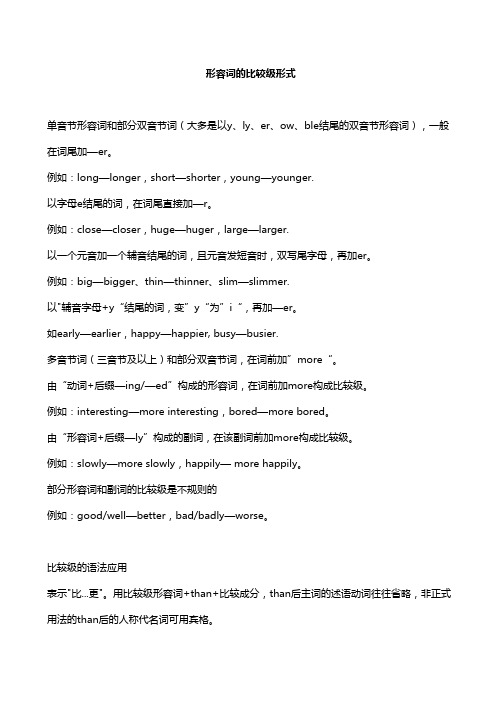
形容词的比较级形式单音节形容词和部分双音节词(大多是以y、ly、er、ow、ble结尾的双音节形容词),一般在词尾加—er。
例如:long—longer,short—shorter,young—younger.以字母e结尾的词,在词尾直接加—r。
例如:close—closer,huge—huger,large—larger.以一个元音加一个辅音结尾的词,且元音发短音时,双写尾字母,再加er。
例如:big—bigger、thin—thinner、slim—slimmer.以"辅音字母+y“结尾的词,变”y“为”i“,再加—er。
如early—earlier,happy—happier, busy—busier.多音节词(三音节及以上)和部分双音节词,在词前加”more“。
由“动词+后缀—ing/—ed”构成的形容词,在词前加more构成比较级。
例如:interesting—more interesting,bored—more bored。
由“形容词+后缀—ly”构成的副词,在该副词前加more构成比较级。
例如:slowly—more slowly,happily— more happily。
部分形容词和副词的比较级是不规则的例如:good/well—better,bad/badly—worse。
比较级的语法应用表示"比...更"。
用比较级形容词+than+比较成分,than后主词的述语动词往往省略,非正式用法的than后的人称代名词可用宾格。
表示"较...低;不及..."用less+原级形容词+than+比较成分。
表示两者之中"较...",用the+比较级+of the two。
定冠词或指示形容词+比较级+名词表示比较。
有少数以ior结尾的形容词,如inferior(次于),junior(年幼的;下级的),posterior (之后),prior(之前),senior(年长的,上级的),superior(优于)等本身就有比较的意思,常与介系词to连用。
人教英语八年级上册 Unit3形容词的比较及如何变化
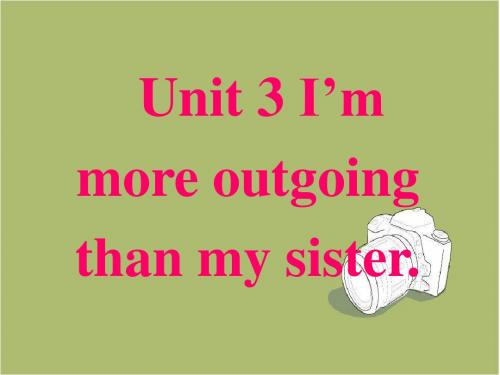
later nicer wilder beautiful interesting
gboeottder many more
Exercises:
1. He is h_ea_v_ie_r_ than Tom. 2. Tom is t_h_in_n_e_r than Lucy.
late-- later
重读闭音节词末尾只有一 个辅音字母时, 先双写这个 辅音字母, 再加-er。
big – bigger thin – thinner fat-- fatter
以“辅音字母+ y”结尾的,
先改y为i, 再加-er。
easy – easier happy – happier
funny-- funnier
6.Jim比Peter更文静
Jim is calmer(quieter) than Peter
7.赵本山比小沈阳更好玩
Zhao Benshan is funnier than Xiao Shenyang
8.Lisa比Linda更聪明的多
Lisa is much smarter than Lind
9.我比他更严肃一点
She is a little more outgoing thanller
than her.
她比我爽朗的多。
She is much more outgoing than me.
1Wu Lin ran B faster than the other boys in the sports meeting.
Exercises:
6. Lucy is _____ than Lily. A. quiet B. more quiet C. quieter
七年级英语语法形容词的比较级
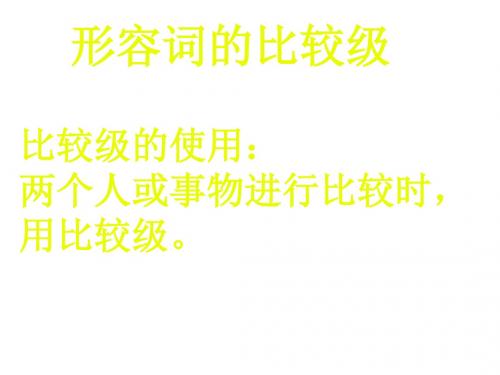
不规则变化: many more much
little good well
most
less better
least
best
副词比较级和最高级:
在词前加more或(the)most
more/ (the) most
quickly loudly slowly
形容词最高级的使用: 三个或三个以上的人或事 物进行比较,用最高级。
形容词的比较级
比较级的使用: 两个人或事物进行比较时, 用比较级。
基本句式:
A + 系+形容词比较级+ than +B
形容词可分为: 多音节词 双音节词
单音节词
形容词比较级和最高级的 构成: 规则变化 多音节和部分双音节词, 在词前加more或the most。
intelligent expensive comfortabl e beautiful difficult important dangerous
popular regular careful interesting excited exciting
特殊: 1.favorite 无比较级 2.healthy healthier
healthiest
比较级前可用 even, much 来修饰,表示“更……”, “……得多”: Eg. 1. Sports are much more popular than games. 2. PE is even more popular than the arts.
基本句式:
A+系+the +形容词最高级+(名词) +表示范围短语(in, among, of…)
形容词、副词比较级及最高级课程案例

3. She felt ill yesterday and she feels even w__o_r_s_e__
today. (ill)
4. He is much _y_o_u_n__g_etrhan his younger brother.
(young)
5. Lily is t_h_e__y_o_u__n_g_er of the two. (young)
改正下列句子中一处的错误。 A. Tom comes to school late than Jim._____ B. Which do you like better , cats ,dogs,or chickens? _____ C. Who is oldest in our class? _____ D. He thinks math is importanter than Chinese.______ E. This work is very harder than that one.________ F.He lives farer than any other student in your class._______
最高级的用法
(good)
表示三者或三者以上(人或事物)的比
较用最高级,最高级的前面一般要加定 冠词the,后面可带of(in, among) 短语来说明比较的范围.
1.她女儿是她们学校最好学生之一.
Her daughter is _o_n_e__o_f _th_e_b_e_s_t_s_tu_d_e_n_ts in her school.
比较级的用法:
He runs faster than she. He runs much faster than she.
多音节词和部分双音节词在词前加 more
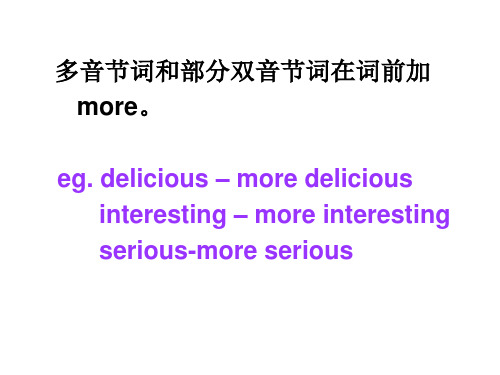
28岁 Lin Xinru is young. Liu Yifei is younger. Liu Yifei is younger than Lin Xinru.
18岁
The blue ruler is long. The red ruler is longer,
The red ruler is longer than the blue ruler.
我们已经初步学了比较级的运用, 那么在生活中我们如何让运用比 较级呢?
问年龄:
How old are you?
问身高:
How tall are you?
问体重
How heavy are you?
问长短:
How long is your leg?
问大小:
How big are your hands?
多音节词和部分– more delicious interesting – more interesting serious-more serious
多音节比较级的练习
• 多音节是指大于等于3个音节的单词。前面 +more(更加),表示更加怎么样。 • beautiful– more beautiful • excited—more excited
2.Lucy is 159 cm, Alice is 16 cm shorter than 143 Lucy, Alice is (159-16=143) _______________cm. 3.Amy is 43 kg, Zhangpeng is 23 kg heavier 66 than Amy, Zhangpeng is (43+23=66) ____________kg.
综合练习
多音节词和多数双音节词在其前面加more(精)
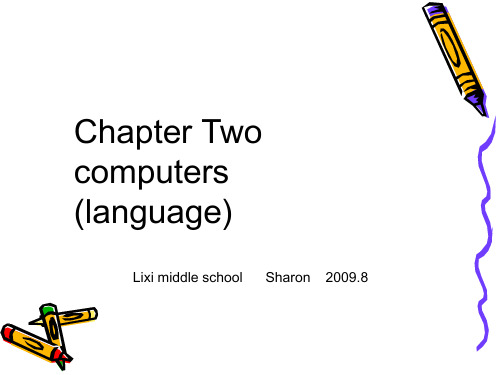
difficult popular slowly
原级 good well bad ill many much little far old
比较级
最高级
better worse more
best worst most
less least farther/further farthest/furthest older/elder oldest/eldest
Homework: 1.To share your good ideas about how to review the comarative degrees of the adjectives.
2.Try to find English proverbs with the comparative degrees.
taller tallest 比较 hardest 化 harder 原级 最高 larger wider largest级 widest 级 biggest bigger hotter tall hard fattest 单音节词在词尾加-er(比较级)或- hottest large wide fatter wetter est(最高级)以字母e接尾的词加-r wettest happiest 或-st happier drier driest earliest big hot 以重读闭音节结尾的词末尾只有一 earlier 个辅音字母应双写辅音字母再加er thin fat wet narrowest 或est most difficult narrower dry cleverest 以辅音字母+y结尾的词变为i再加- happy most popular cleverer early more difficult er,或-est most slowly narrow more popular 少数以-er,-ow结尾的双音节 clever more slowly 词可加-er或-est
- 1、下载文档前请自行甄别文档内容的完整性,平台不提供额外的编辑、内容补充、找答案等附加服务。
- 2、"仅部分预览"的文档,不可在线预览部分如存在完整性等问题,可反馈申请退款(可完整预览的文档不适用该条件!)。
- 3、如文档侵犯您的权益,请联系客服反馈,我们会尽快为您处理(人工客服工作时间:9:00-18:30)。
18岁
Liu Yifei is younger.
Liu Yifei is younger than Lin Xinru.
The blue ruler is long. The red ruler is longer,
The red ruler is longer than the blue ruler.
我们已经初步学了比较级的运用, 那么在生活中我们如何让运用比 较级呢?
问年龄:
How old are you?
问身高:
How tall are you?
问体重
How heavy are you?
问长短:
How long is your leg?
问大小:
How big are your hands?
◇Look at the pictures and understand
看图并理解
fast
faster
填空题—比较级填空
1. A is 10 years old, B is 11 years old. —A is __yo_u_n_g_er than B.
2. Tom is 160 cm, Lucy is 170 cm. —Lucy is _ta_l_le_r___than Tom.
多音节词和部分双音节词在词前加 more。
eg. delicious – more delicious interesting – more interesting serious-more serious
多音节比较级的练习
• 多音节是指大于等于3个音节的单词。前面 +more(更加),表示更加怎么样。
2.Lucy is 159 cm, Alice is 16 cm shorter than Lucy, Alice is(_1_5_9_-1_6_=_1_4_3_)__1_4_3_cm.
3.Amy is 43 kg, Zhangpeng is 23 kg heavier than Amy, Zhangpeng is (_4_3_+_2_3_=_6_6)__6_6_kg.
以不发音的e结尾
• 不发音的e结尾,或者指单个e结尾的,不 包括发音的e和字母组合。
• large--_l_a_rg_e_r__ • nice --_n_i_c_e_r __ • fine --__fi_n_e_r __
综合练习
• tall— taller • funny— funnier • large— larger • big— bigger • beautiful— more beautiful • good— better
My dress is more beautiful than hers.
Zeng Zhiwei is short.
than 比
Pang Changjian is shorter. Pang Changjian is shorter than Zeng Zhiwei.
2.26m
Jordan
1.98m
Jordan is tall. Yao Ming is taller. Yao Ming is taller than jordan.
80岁
90岁
Liu Huan is old .
Fei Mao is older .
Fei Mao is older than Liu Huan.
28岁
Lin Xinru is young.
[‘mitɚ]
meter 米
[bəʊθ] both两个都
Read and write
• Countryside [‘kʌntrɪsaɪd] 乡村
• Lower
[‘ləʊə] 更低
• Shadow
[‘ʃædəʊ] 影子
• Smarter [‘smɑ:tə] 更聪明
• become [bɪ‘kʌm] 成为
Grammar Focus
英格驾考 英格驾考科目一 科目四 2016最新学车题 学车小游戏 学车类小游戏 汽车游戏 赛车游戏
二、形容词的比较级的用法
1.表示两者 (人或事物) 的比较。 eg. I am taller than Tom.
• beautiful– more beautiful • excited—more excited
构成的不规则变化: eg. good / well – better
bad / badly – worse many / much – more little – less far – farther / further
3. The elephant is 893 kg, the pig is 158 kg. —The elephant is _h_e_a_vi_e_r _than the pig.
填空题—计算
1.A is 23 years old, B is 4 years older than A. B is _(2_3_+_4_=_2_7_)__2_7_ years old.
How old are you?
I’m 20 years old.
How tall are you?
I’m 150centimeters(tall). ['sentə,mi:təz]
I’m 1.50meters(tall). point How heavy are you? I’m 46 kilograms . ['kiləgræm]
4. This classroom is __________than that one.
A. many big
B. much big
C. many bigger D. much bigger
Let’s talk Let’s
tal
[hɔːl]
hall 大厅
